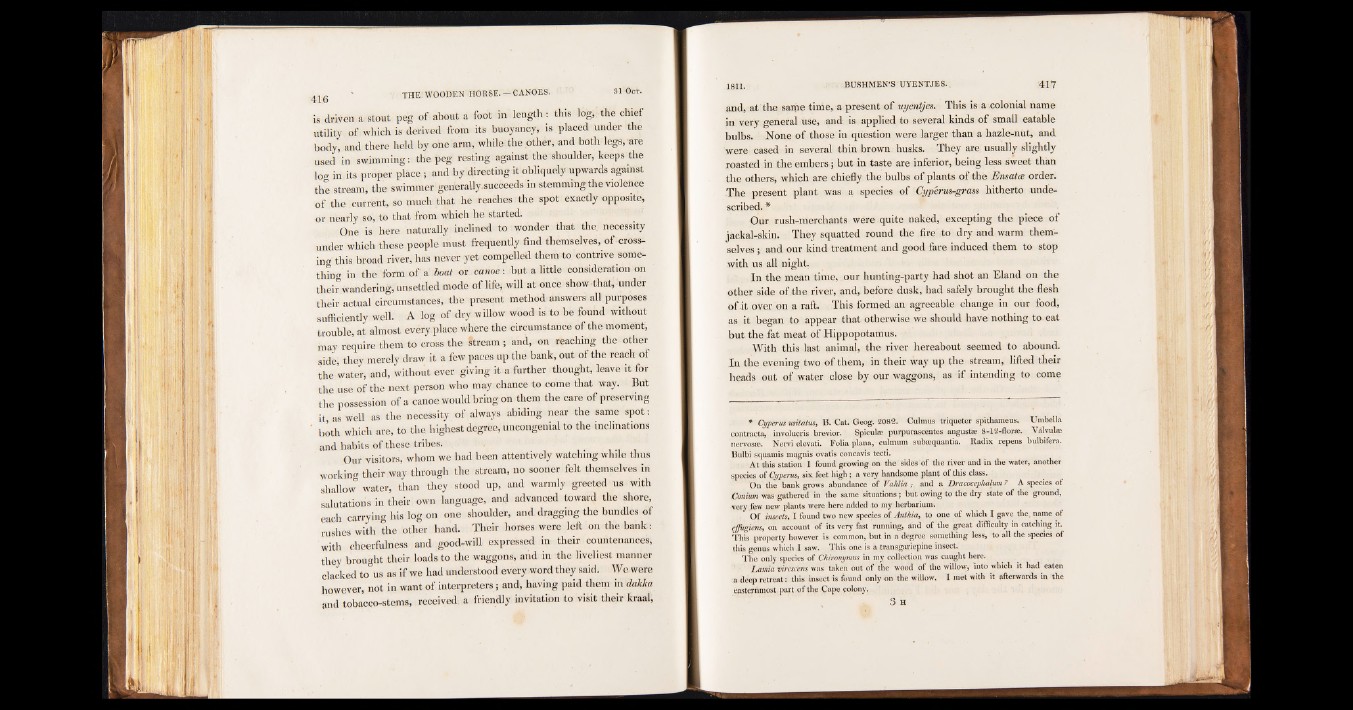
is driven a stout peg of about a foot in length : this log, the chief
utility of which is derived from its buoyancy, is placed under the
body, and there held by one arm, while the other, and both legs, are
used in swimming: the peg resting against the shoulder, keeps the
log in its proper place ; and by directing it obliquely upwards against
the stream, the swimmer generally.succeeds in stemming the violence
of the current, so much that he reaches the spot exactly opposite,
o r n e a r l y so, to that from which he started.
One is here naturally inclined to wonder that the. necessity
under which these people must frequently find themselves, of crossing
this broad river, has never yet compelled them to contrive something
in the form of a boat or canoe-, but a little consideration on
their wandering, unsettled mode of life, will at once show that, under
their actual circumstances, the present method answers all purposes
sufficiently well. A log of dry willow wood is to be found without
trouble, at almost every place where the circumstance of the moment,
may require them to cross the Stream ; and, on reaching the other
side, they merely draw it a few paces up the bank, out of the reach of
the water, and, without ever giving it a further thought, leave it for
the use of the next person who may chance to come that way. But
the possession of a canoe would bring-on them the care of preserving
it as well as the necessity of always abiding near the same spot:
' both which are, to the highest degree, uncongenial to the inclinations
and habits of these tribes. .
Our visitors, whom we had been attentively watching while thus
working their way through the stream, no sooner felt themselves in
shallow water, than they stood up, and warmly greeted us with
salutations in their own language, and advanced toward the shore,
each carrying his log on one shoulder, and. dragging the bundles of
rushes with the other hand. Their horses were left on the bank:
with cheerfulness and good-will expressed in their countenances*
they brought their loads to the waggons, and in the liveliest manner
clacked to us as if we had understood every word they said. We were
however, not in want of interpreters; and, having paid them in dakka
and tobacco-stems, received a friendly invitation to visit their kraal,
and, at the same time, a present of uyentjes. This is a colonial name
in very general use, and is applied to several kinds of small eatable
bulbs. None of those in question were larger than a hazle-nut, and
were cased in several thin brown husks. They are usually slightly
roasted in the embers; but in taste are inferior, being less sweet than
the others, which are chiefly the bulbs of plants of the Ensatce order.
The present plant was a species of Cyperus-grass hitherto undescribed.
*
Our rush-merchants were quite naked, excepting the piece oi
jackal-skin. They squatted round the fire to dry and warm themselves
; and our kind treatment and good fare induced them to stop
with us all night.
In the mean time, j our hunting-party had shot an Eland on the
other side of the river, and, before dusk, had safely brought the flesh
of-it over on a raft. This formed an agreeable change in our food,
as it began to appear that otherwise we should have nothing to. eat
but the fat meat of Hippopotamus.
With this last animal, the river hereabout seemed to abound.
In the evening two of them, in their way up the stream, lifted their
heads out of water close by our waggons, as if intending to come
* Cyperus usitatus, B. Cat. Geog. 2082. Culmus triqueter spithameus. Umbella
contracta, involucris brevior. Spiculae purpurascentes angustee 8-12-florte. Vdlvula;
nervosa;. Nervi elevati. Folia plana, culmum subaequantia. Radix repens bulbifera.
Bulbi squamis mngnis ovatis concavis tecti.
At this station I found growing on the sides of die river and in die water, another
species of Cyperus, six feet high; a very handsome plant of this class.
On the bank grows abundance of Vahlia ,• and a Dracocephdlum ? A species of
Conium was gathered in die same situations; but owing to the dry state of the ground,
very few new plants were here added to my herbarium.
Of insects, I found two new species of Anthia, to one of which X gave the. name of
effugiens, on account of its very fast running, and of die great difficulty in catching it.
This property however is common, but in a degree something less, to all die species of
this genus which I saw. This one is a transgariepine insect.
The only species of Chironymus in my collection was caught here.
Lamia vivcsccns was taken Put of the wood of the willow, into which it had eaten
a deep retreat: this insect is found only on the willow. I met with it afterwards in the
easternmost part of the Cape colony,